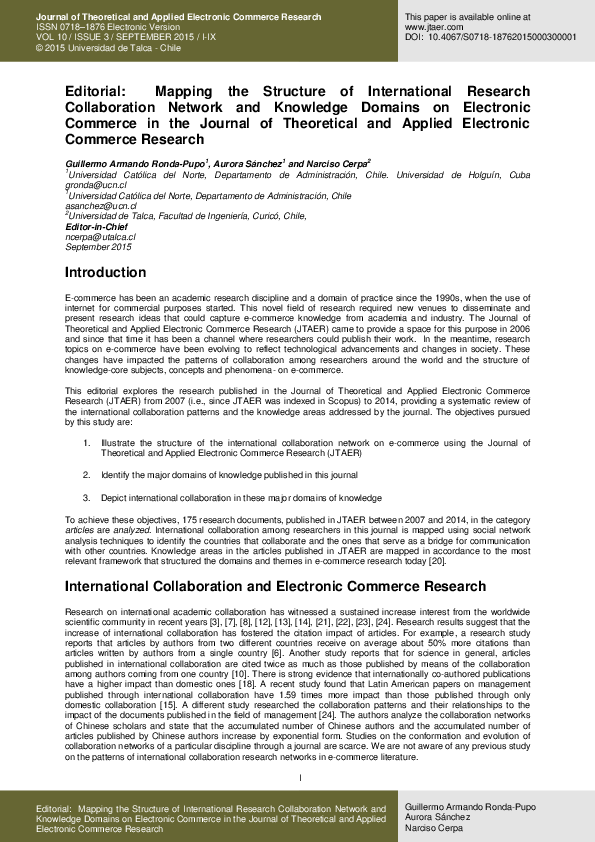Interplay between Platform Providers and Complementors via Affordance, Autonomy, and Super-Modularity: The Empirical Investigation of the Korean Digital Industry
IF 5.1
3区 管理学
Q1 BUSINESS
Journal of Theoretical and Applied Electronic Commerce Research
Pub Date : 2024-04-26
DOI:10.3390/jtaer19020051
引用次数: 0
Abstract
This study examines the dynamic interplay between platform providers and complementors in the context of digital ecosystems, focusing on the complementary factors of affordance, autonomy, and super-modularity. Using national survey data from the Korean digital industry, the study applied multivariate ordered probit and k-mode clustering models to analyze what determines these factors and how these factors are interrelated from the perspective of platform providers and complementors, respectively. The results indicate that platform providers with open APIs promote affordance, but providing an SDK inhibits affordance. In terms of complementors, choosing a platform providing APIs increases super-modularity. And affordance increases when using the platform for logistics and new product development. In addition, we found that affordance and autonomy have a trade-off relationship from the perspective of both platform providers and complementors. Finally, we classified platforms and complementors into subgroups with respect to affordance, autonomy, and super-modularity using cluster analysis and found that the size of a complementor’s firm, such as revenue and number of employees, influences which platform it chooses. Conversely, the size of a platform provider also influences how much autonomy and collaboration it offers. This study contributes to the understanding of digital platform ecosystems and provides insights for practitioners on how to leverage platform dynamics to enhance competitive advantage.通过亲和力、自主性和超模块化实现平台提供者与补充者之间的相互作用:韩国数字产业的实证调查
本研究探讨了数字生态系统背景下平台提供者与互补者之间的动态互动关系,重点关注可负担性、自主性和超模块性等互补因素。本研究利用韩国数字产业的全国性调查数据,采用多元有序概率模型和 K 模式聚类模型,分别从平台提供者和补充者的角度分析了决定这些因素的因素以及这些因素之间的相互关系。结果表明,提供开放式应用程序接口的平台提供商会促进可负担性,而提供 SDK 则会抑制可负担性。从补充者的角度来看,选择提供应用程序接口的平台会增加超模块性。而在使用平台进行物流和新产品开发时,承受能力也会提高。此外,我们还发现,从平台提供者和补充者的角度来看,可负担性和自主性之间存在权衡关系。最后,我们利用聚类分析法将平台和补充者按可负担性、自主性和超模块性划分为不同的子群,发现补充者公司的规模(如收入和员工人数)会影响其选择的平台。相反,平台提供商的规模也会影响其提供自主性和协作性的程度。这项研究有助于人们了解数字平台生态系统,并为从业者如何利用平台动态提升竞争优势提供了启示。
本文章由计算机程序翻译,如有差异,请以英文原文为准。
求助全文
约1分钟内获得全文
求助全文
来源期刊
CiteScore
9.50
自引率
3.60%
发文量
67
期刊介绍:
The Journal of Theoretical and Applied Electronic Commerce Research (JTAER) has been created to allow researchers, academicians and other professionals an agile and flexible channel of communication in which to share and debate new ideas and emerging technologies concerned with this rapidly evolving field. Business practices, social, cultural and legal concerns, personal privacy and security, communications technologies, mobile connectivity are among the important elements of electronic commerce and are becoming ever more relevant in everyday life. JTAER will assist in extending and improving the use of electronic commerce for the benefit of our society.

 求助内容:
求助内容: 应助结果提醒方式:
应助结果提醒方式:


